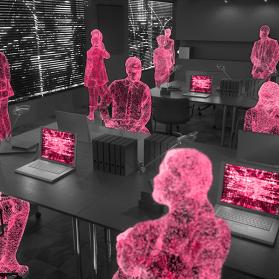Prof. Philipp Sandner trains the next generation of finance professionals at the Frankfurt School of Finance & Management. He expects CFOs to be an essential driving force for blockchain as well as innovation. At this time, however, lighthouse projects in this area are few and far between in companies. In an interview with Detecon experts Björn Froese and Hans-Werner Hatting, he explains why this is the case and what must happen for things to change.
Björn Froese: In our previous Web3 interview, Dr. Karl-Michael Henneking, co-founder of the globally operating distributed economy network Untitled INC, said that modern CFOs are taught in your classes at the Frankfurt School of Finance because they must be familiar with digital topics and digital asset issues. What digital skills do you believe the CFOs of the future will require?
In my view, the position of the CFO will play a key role in the future. The CFO is where many topics that are, at least to some degree, relevant to blockchain converge. At Siemens, for example, you see that the CFO’s department in particular is highly active in this sense with respect to treasury matters. Various issues are involved (regulatory compliance, for instance), but there is also the question of the integration of the new Chinese currency system. The conduct of projects concerning digital securities continues as well. Not everything is operating “at scale” at this time, but experiments to find solutions are underway.
Tasks of this sort are usually handled by the finance department and, of course, must be supervised by the CFO. That is why CFOs are an essential driving force for blockchain as well as innovation. It's unfortunate that probably 90 per cent of CFOs today are completely unaware of their opportunities in this area.
Björn Froese: So Siemens is playing a pioneering role. Do you also see this happening at other DAX companies?
No. Siemens is really far ahead of everyone else. The CFO at Evonik is already active in this direction; at Bosch, this is more likely to arise from within the R&D department. Everywhere else, the topic of blockchain is still largely confined to a niche existence — banks excepted, of course.
Our interview partner: Prof. Dr. Philipp Sandner
Prof. Dr. Philipp Sandner has founded the Frankfurt School Blockchain Center (FSBC) at the Frankfurt School of Finance & Management. From 2018 to 2021, he was ranked among the “top 30” economists by the Frankfurter Allgemeine Zeitung (FAZ), a major newspaper in Germany. Further, he belonged to the “Top 40 under 40”¿—¿a ranking by the German business magazine Capital. He has been a member of the FinTech Council and the Digital Finance Forum of the Federal Ministry of Finance in Germany. He is also on the Board of Directors of FiveT Fintech Fund, 21e6 Capital and Blockchain Founders Group - companies active in venture capital financing for blockchain startups and crypto asset investment management.
The expertise of Prof. Sandner includes blockchain technology in general, crypto assets such as Bitcoin and Ethereum, decentralized finance (DeFi), the digital euro, tokenization of assets, and digital identity.
Hans-Werner Hatting: You mentioned China and the Chinese digital currency. One would expect that German companies like Volkswagen that are deeply involved in China have no choice but to come on board. Are there any signs of this development?
Yes, but we are still at the very beginning. The new currency system in China has been in place for a year now and is already being used by a couple of hundred million people, but its status today is still more that of a Chinese credit card. Customers occasionally pay for an expresso with it — but the system still has to be ramped up in terms of payment volume, user base, and so on. In this sense, these systems are not yet in common use today, especially in B2B transactions. There is still a certain amount of time for a corporation to prepare.
And that is why what Siemens has done is important. But these are early experiments with many unanswered questions. How can it be organized? Who can be of assistance? Are there any consultants, any banks providing this support? Or do you have to do everything yourself because neither banks nor consultants can help? That's why, in my view, examining the issue closely is crucial. At this point, no one has been left behind because developments are just now gaining momentum.
Hans-Werner Hatting: These early developments are of essential concern for us as a management and technology consultancy. We have an office in Beijing and are constantly reviewing the requirements that German companies going to China will be facing.
Yes, I think that makes sense. This responsibility could be assigned to a Chinese subsidiary. But to be honest, banks and financial service providers with this capability are still lacking. A corporation has access to bank accounts in the treasury department, but the money is held in safekeeping by a bank. There are still virtually no financial service providers or banks that could do this on behalf of a corporation. So the logical consequence is that a corporation must today still take these matters into its own hands and take advantage of the technology that manages the wallet.
This also applies to blockchain-based dollar stablecoins, for example. Corporations, of course, have extraordinary difficulty in managing themselves the account where money ends up. This is normally the domain of a bank, which is “plugged in” to the SAP system as a kind of supplier. That does not yet exist for all these new payment instruments.
Hans-Werner Hatting: What are these payment systems?
We are essentially talking about the Chinese system E-Yuan. But there are also blockchain networks with their stablecoins — dollars based on blockchain, so to speak — and now that El Salvador has made Bitcoin its official state currency, it can also be Bitcoin if, for example, an employee there wants to receive his or her salary in Bitcoin. Still, these are all edge cases. As of today, no one would view them as megatrends. The trend has yet to take off, really. But it is worth our while to take a look at what is coming.
Björn Froese: Let’s return to the CFO training that is offered at the Frankfurt School in conjunction with the Blockchain Center. Who participates in this course of study?
First of all, I don’t think attendance at the Frankfurt School or any other university is an absolute necessity to learn the material. The staffs at Siemens and Evonik taught themselves. But I believe that a university can systematize and certainly also standardize and accelerate the learning process.
Ultimately, the finance department is an incredibly complex unit. Payment processes, financing issues, corporate finance — all of these responsibilities fall in its purview. And the subject of blockchain, the regulatory and technological aspects, and many more issues have been integrated into its operations as well. The topic is still a minor one, but you can already see today how its importance is increasing.
That’s why I think it's urgent for people wanting a job in finance to become adept at handling the subject of blockchain. Above all, the cryptocurrency issues. Is it essential for established senior CFOs over the age of 60 to immerse themselves in the material? Not necessarily. But anyone with ambitions for the executive suites of the day after tomorrow must slowly, but surely, master the subject. And that can’t be achieved without technical expertise. That’s why a lot of people struggle in this area; they must and even want to learn about it, but don’t really want anything to do with the technology. They won’t feel at ease.
Björn Froese: Is the new EU regulation MiCAR (Markets in Crypto-Assets Regulation) already an issue? Has this law changed anything on the market — and is it helpful?
While the statute has been in the works for four years and we could see two years ago the direction it was taking, it has only just now been cast in the final form that will enter into force at the beginning of 2025. So now, logically enough, you see companies, lawyers, and consultants paying more and more attention to MiCAR so that they understand exactly what it is and where the potential new business models might arise. Its implementation is not actually being planned yet, with the possible exception of some startups. The startups are already a step ahead in this respect and are beginning to program applications for which the MiCAR can be used later.
With only a few exceptions, large corporations are still having a bit of a hard time. Deka Bank in Frankfurt has created a platform — its subsidiary SWIAT — where, although not absolutely the MiCAR, but in any case the German Electronic Securities Act (eWpG) will be followed and where savings bank certificates will make the rounds. These savings bank certificates have now become quasi-digital and are mapped on the SWIAT platform, as was recently reported in the media. Or Siemens: Siemens has created a green bond based on blockchain — 50 million with Hauck Aufhäuser and a startup.
These are the lighthouse projects. Unfortunately, there is currently little expertise in companies for taking advantage of these new opportunities. These chances have been put on the table, but so many potential beneficiaries just leave them lying there instead of seizing them.
Hans-Werner Hatting: What exactly is the opportunity that existing instruments do not offer?
First of all, the process of issuance can proceed faster, it’s cheaper, and potentially further opportunities will arise in the future because the shares are transferred more efficiently, de facto the secondary market, the trading that makes that possible. These are processes that can be realized much better — especially when using blockchain technology and through dematerialization, i.e., eliminating the need for a certificate document. I can issue a debenture bond and transfer it to Telekom tomorrow, from Telekom to the bank the day after tomorrow, then back again the day after the day after tomorrow.
Without any problems whatsoever, because the bond is simply recorded in a register that is made for digital imaging and digital commerce. But first you need a trading platform. Of course, this does not yet exist, but there are already indications that it is on its way. The government has adopted a good regulation, and we can assume that it will be applied more and more frequently. Besides the MiCAR, there is also the so-called DLT Pilot Regime, which will ultimately allow securities to be traded throughout the EU. This is really a great development from my point of view.
Hans-Werner Hatting: Another advantage could be greater transparency in valuation. There are many instruments where mark-to-market is relatively difficult because the assets are traded “over the counter.” When we have the right platforms for cryptocurrencies, it will probably also be easier to obtain and compare prices.
Absolutely. And I think that’s exactly the right step. This will all be standardized and systematized on a Europe-wide level and across multiple asset classes. The manual component of individual preparation is likely to disappear bit by bit. But as I said before, you mustn’t exaggerate these forecasts. It will be a long road, taking 10 to 15 years, maybe even longer. The good news is that you can start the process without being under too much pressure.
Björn Froese: Do you think that a digital euro or even CBDC (Central Bank Digital Currency) would bring the necessary clarity for the banks insofar as they are once again consolidated in their role, i.e., it is clarified that we can maintain a two-tier banking system and their positioning on the cryptocurrencies market can become clearer?
After all, the ECB has announced its intention to launch the digital euro. But interpreting precisely what the ECB is planning is not a simple matter. From my personal point of view, what the ECB is doing is targeting the credit card sector — Mastercard, PayPal, Visa, where retail payments are made electronically, digitally at the point of sale or in e-commerce.
And if you assume that, then you come to the conclusion that the digital euro — speaking very roughly — will actually become a kind of prepaid debit card, issued by the state. That is the difference. And issued on a sovereign European infrastructure, that's the advantage. The term “digital euro” sounds incredibly significant, but with this likely scenario, it becomes tangible again and you can assess what it can— and cannot — do.
Björn Froese: Whether additional attribution of values will take place; for example, the possibility to set a negative interest rate on the balance.
Right. It will be a fascinating process because the European Commission has now issued its legislative proposal. We can now see what direction this is supposed to take. The European Central Bank and the European Commission are, after all, separate at this point. That is to say, their actions may differ, but it is safe to assume that the institutions are talking to one another and working toward a coordinated approach.
Hans-Werner Hatting: If you look at the information published on the ECB’s website, you can see clear efforts to counter such fears in advance because discussions revolving around the issue are already becoming heated at times.
Yes, that is correct. But where are these heated discussions coming from? Ultimately, they are the consequence of the ambiguity and that people — whether journalists or citizens — simply don’t know what it will mean for them. They naturally start to assume the worst. But as I said, if you try to understand the whole issue roughly as a kind of prepaid debit card, then the related fear should actually disappear at the same time.
Björn Froese: How do you see the current development of the use of cryptocurrencies in the sector, and what is your prediction?
It is not at all uncommon in this sector that a great many predictions have not come true. Four or five years ago, the expectation was that things like blockchain and energy, blockchain and mobility, and so on, would have to mesh beautifully and that new ecosystems would emerge. But none of that has happened. There was also the expectation that enterprise blockchain systems like Hyperledger and R3-Corda would slowly become the norm. That hasn’t happened, either. But instead, many things have happened that were not anticipated.
The most important thing here is to distinguish B2B companies from B2C companies. B2C companies have actually made their first successful forays into blockchain such as NFTs on digital objects. This has already worked quite well here and there. B2B companies struggle to find sensible use cases. From my point of view, the topic of CO2 tokenization is quite an interesting use case, i.e., the mapping of CO2 allowances on a blockchain basis and making them available to companies so that they can ultimately use them for offsetting. This is of general interest for the sector. But of course, this is also an area that is still very small and must first grow.
Björn Froese: If we take a step back and look at the whole spectrum: What’s the next big knot that needs to be untied so that a great leap forward can be taken?
There are still a lot of doubting Thomases in organizations who focus on what doesn’t work. Instead, there is a general lack of openness and curiosity about technology and, above all, the ability, and in some cases the budget, to try things out. You cannot learn blockchain topics and the like from a book, not even in seminars, you must have realized them in actual projects. However, this means that learning does not occur at all at the moment. You can’t blame the government here — everything has really been done as well as possible with the adoption of good regulation.
So what else would be helpful? The positive development of Bitcoin because so much correlates with Bitcoin. Every token, all the media hype is derived from Bitcoin. All the attitudes in the Web3 sector are indirectly related to or correlated with Bitcoin. If Bitcoin were now to rise significantly again, the spotlight would immediately be back on it and various projects would be restarted. I am relatively sure about that. Bitcoin, even though it cannot be influenced, is of quite major significance in this sense.
Björn Froese: Professor Sandner, thank you very much for this interesting interview.








